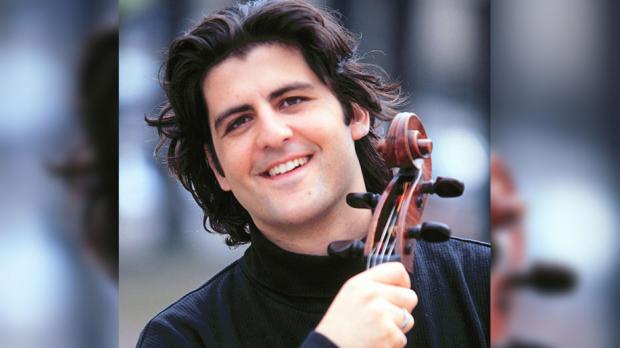Amit Peled at the BPO: It’s All In The Telling
This weekend’s Buffalo Philharmonic Orchestra concert is titled Symphonic Tales, an appropriate sobriquet, as the BPO’s program is full of stories. Some of the most interesting surround this weekend’s guest soloist, cellist Amit Peled (b. 1973, Israel). Peled grew up on a small, somewhat isolated kibbutz in northern Israel. A regular kid who loved to play basketball, he received around his 10th birthday a cassette tape of the renowned cellist Pablo Casals (Spanish, 1876-1973), a master musician who revitalized and shaped contemporary cello playing much as Segovia did for the guitar and Kreisler for the violin.
Every night, Peled would put the cassette in his boom box and listen as it lolled him to sleep. Around this same time, his school mandated that the students choose a musical instrument to learn. Peled was inspired not only by Casals’s playing but also by a girl four years his senior whom he watched practice though the window and with whom he immediately became smitten. Although he had entirely planned out his life together with her in his mind, his love remained unrequited; he never even spoke to her.
He persisted with his cello studiesand, although by his full growth had attained the height on six feet, five inches, making him ideal for hoops, the cello ultimately won out. He currently teaches at the Peabody Conservatory of Johns Hopkins University and travels extensively as an orchestral soloist and as a much-in-demand chamber music performer. He has received enthusiastic plaudits from audiences and resounding praise from the critics: “Simply gorgeous sound. His amiable and inviting personality is exactly the type everyone says we need more of it classical music is to survive” (Tim Smith, Baltimore Sun); “Overwhelmed us with waves of emotion” (Ha’aretz, Israel); “He has the flair of the young Rostropovich” (American Record Guide); “How can anything be better than this?” (Pitea-Tidningen, Sweden).
Peled’s other story centers on his cello, which was made by the master Venetian luthier Mateo Goffriller in 1733. Through a colleague, Peled was introduced to Marta Casals Istomin, the cellist’s widow. After a long conversation that was part master class, part interrogation, she gave her husband’s cello to Peled. The instrument, which reeked of cigar smoke—Casals was notorious for smoking a cigar during lessons, the ashes often falling though F-holes into the body of the instrument—hadn’t been played since the great cellist’s death some 40 years ago and needed some restoration. The result is the glorious instrument you will hear Peled play with the BPO.
The story of the work he will play, Dvořák’s (Bohemia, 1841-1904) Cello Concert in B minor, has an interesting local angle. Between 1892 and 1895, Dvořák was the director of the National Conservatory of Music of America in New York City. During 1893, he journeyed to Chicago where he conducted his Eighth Symphony at the World Columbian Exhibition, later traveling on to Spillville, Iowa, a community with a large Czech speaking population. During his travels by rail to and from the Midwest, he had to have passed through Buffalo, and stayed over long enough to visit Niagara Falls. When he composed his Cello Concerto, in 1985, he found the inspiration for building, tumultuous opening of the concerto in the roaring majesty of that cataract.
The two works that open this program were written within few years of Dvořák’s Concerto, and each are programmatic works to some degree. Paul Dukas’s (French, 1865-1935) The Sorcerer’s Apprentice, a tone poem written in 1897, will, in terms of narrative, forever be associated with the animated cartoon featuring the hapless Mickey Mouse as the overwhelmed apprentice drowning when his spell over a broom to carry the water for him runs terribly awry. Florent Schmidt’s (French, 1870-1958) The Haunted Palace is a symphonic study inspired by Edward Allan Poe’s poem of the same name written between 1900 and 1904. The six-stanza poem begins with a description of a stately and radiant palace overlooking a happy valley that is ultimately overtaken by “evil things, in robes of sorrow,” debasing the once magnificent palace into house disgorging a hideous, grim faced yet laughing throng. The poem, from 1839, was later incorporate into Poe’s “The Fall of the House of Usher.” Both Dukas and Schmidt, though primarily academics, were contemporaries of Debussy, Ravel and other Impressionist composers. Their music is less formal than evocative and freely conceived. The orchestral colors tell the story. You can hear the Dvořák and Dukas by following links found at bpo.org.
Symphonic Tales takes place Saturday, February 21 at 8pm and Sunday, February 22 at 2:30pm at Kleinhans Music Hall.

